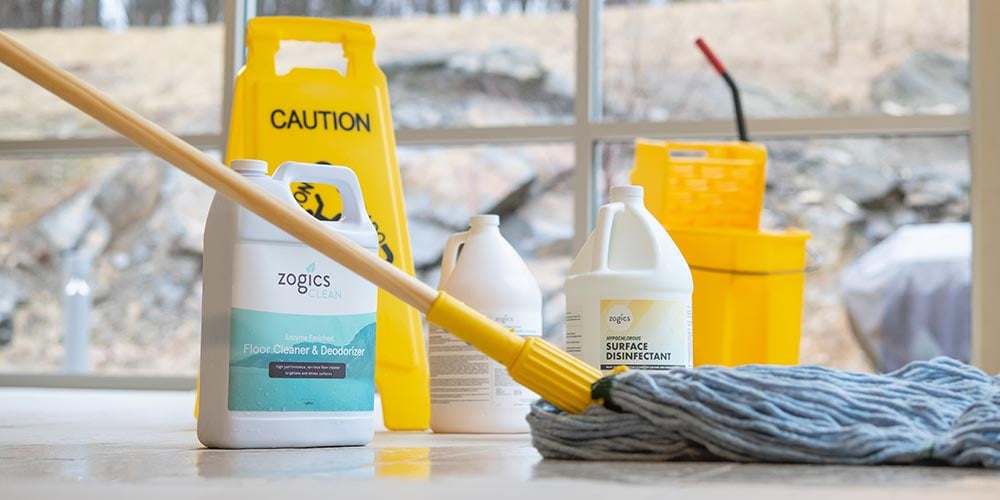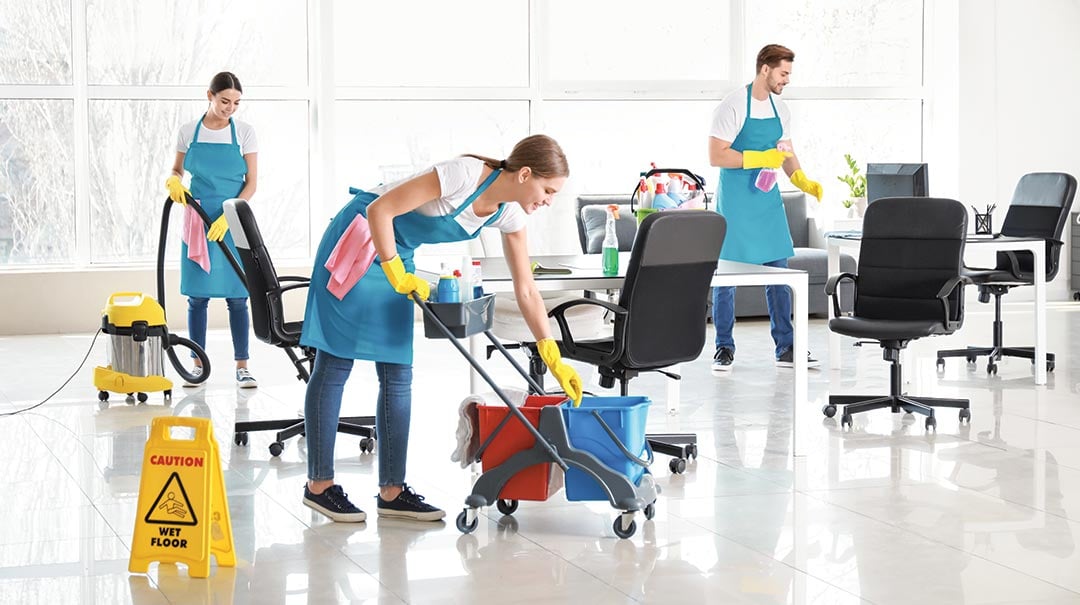How to Choose the Right Cleaning & Disinfecting Products for Your Business
In this post:
- The importance of using the right cleaning and disinfecting products for businesses
- The impact of COVID-19 on cleaning and disinfecting practices
- Overview of the key factors to consider when choosing the right products
Keeping your business clean and hygienic has always been important, but the COVID-19 pandemic brought it to the forefront like never before. Whereas cleaning and disinfecting happened "behind the scenes" prior to the pandemic, employees, guests, and the general public now expect your business to maintain the highest levels of cleanliness and safety at all times. A key component? Selecting the right cleaning and disinfecting products. In this post, we'll explore the key factors to consider when purchasing cleaning and disinfecting products for your business.
Understanding Cleaning and Disinfecting Products
Cleaning chemical products are designed to remove dirt, dust, and other debris from surfaces, while disinfecting products are formulated to kill bacteria, viruses, and other pathogens. Both types of products are important for keeping your business clean and healthy, and using them together can provide maximum protection against the spread of illness.
For more on the difference between the two, check out our post What's the Difference Between Cleaning, Disinfecting & Sanitizing?
There are many different types of commercial cleaning supplies available, including sprays, antibacterial wipes, and concentrates. It's important to choose products that are appropriate for the surfaces you will be cleaning, as well as those that are effective against the specific pathogens you are targeting.

Key Factors to Consider When Choosing Cleaning and Disinfecting Products
When selecting cleaning and disinfecting products for your business, various elements must be taken into consideration.
- Type of business and industry-specific regulations: Different types of businesses have different cleaning and disinfecting requirements, and it's important to understand any regulations that may apply to your industry.
- Surface types and material compatibility: Certain products may be harmful to certain surfaces, so it's important to choose products that are safe for the materials you will be cleaning. Be sure to read your labels!
- Effectiveness against specific pathogens: Different cleaning and disinfecting products may be more effective against specific types of pathogens, so it's important to choose products that are appropriate for your needs.
- Environmental impact and sustainability: Many cleaning and disinfecting products can have a negative impact on the environment, so it's important to choose products that are eco-friendly and sustainable.
- Cost, volume, and availability: Finally, it's important to choose products that are both cost-effective and in stock, and at the right amount for your facility (i.e. a case of wipes vs. a single roll). We'll help you find the right products to meet your budget and needs, and most items we offer ship same-day.
Common Mistakes to Avoid When Choosing Cleaning and Disinfecting Products
There are several common mistakes to avoid when choosing cleaning and disinfecting products. Be on the lookout for:
- Products that are not effective against specific germs and viruses: It's important to choose products that are proven to be effective against the specific germs you are targeting. This information can be found on our product pages, and on the product label.
- Not following the manufacturer's instructions: It's important to carefully follow the manufacturer's instructions for using cleaning and disinfecting products to ensure maximum effectiveness and safety. Dilution rates and dwell times matter!
- Disinfecting without cleaning first: It's vital to clean your rooms or surfaces first before you disinfect them. Removing dirt and debris allows you to really deep clean and disinfect your space.
- Mixing your chemicals: If you start to run short of disinfectant during your cleaning and disinfecting routine, you may be tempted to top off your spray bottle or electrostatic sprayer with a different disinfectant you have on hand, which can lead to a potentially dangerous situation. Certain chemical combinations can damage the eyes, nose, throat, lungs, and nervous system. More dangerous? The explosive mixture of liquid bleach and ammonia creates chloramine gas that damages airways and can be lethal. Bottom line: Never mix cleaning and disinfecting products for any reason.
Best Practices for Using Cleaning and Disinfecting Products
In addition to choosing the right cleaning and disinfecting products, it's important to use them properly to ensure maximum effectiveness and safety. Best practices for using cleaning and disinfecting products include:
- Training employees on proper use: All employees should be trained on the proper use of cleaning and disinfecting products to ensure they are used safely and effectively.
- Creating a cleaning and disinfecting schedule: Establishing a regular cleaning and disinfecting schedule can help ensure that all areas of your business are cleaned and disinfected regularly.
- Ensuring proper ventilation during use: Many cleaning and disinfecting products can produce harmful fumes, so it's important to use them in a well-ventilated area to minimize exposure or wear proper personal protective equipment (PPE).
- Proper storage and disposal of products: Cleaning and disinfecting products should be stored in a safe and secure location, away from children and animals. Disposal should be done in accordance with local regulations.
Choosing the right cleaning and disinfecting products is crucial for maintaining a healthy and safe environment for your business. Consider factors such as industry-specific regulations, surface types, effectiveness against pathogens, environmental impact, and cost when making your selection. Avoid common mistakes such as using products that are not effective against specific pathogens or neglecting the environmental impact of products. Implement best practices such as training employees on proper use, creating a regular cleaning and disinfecting schedule, ensuring proper ventilation, and proper storage and disposal of products. By following these guidelines, you can prioritize effective and responsible cleaning and disinfecting practices in your business.
Related Content:
From cleaning chemicals to durable cleaning tools that perform day in and day out, we have you covered from floor to ceiling. We're your source for all things clean.




